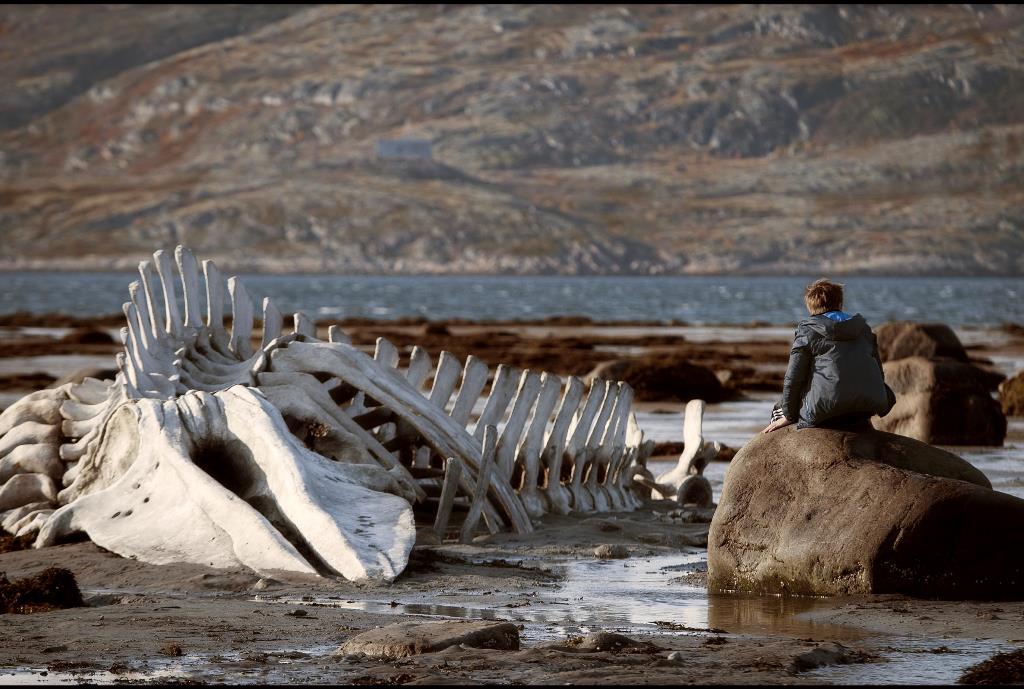There is both beauty and pessimism in “Leviathan” by Russian director Andrei Zviaguintsev (“Elena,” “The Return”), which premiered tonight in competition. The beauty of the film’s bleak setting is striking from the first shot, but the pessimism comes in a subtle creep accompanying a long slow squeeze that pits a man without resources against a system that takes many shapes.
“Leviathan” is set around a small, economically depressed fishing port on a mountain-flanked inlet somewhere in northern Russia. Just as Zviaguintsev depicts a stark land, his characters are equally stark in the simplicity of their needs and goals. Kolya (Alexei Serebriakov), with a ruddy, chiseled face and a hair-trigger temper, lives in the house his grandparents built on a lonely outcropping of land with his second wife Lilya (Elena Liadova) and his teenage son. The town mayor (Roman Madianov), a swinish character with a gangster past who manages to simultaneously fulfill and transcend every stereotype of his kind, wants the land.
Zviaguintsev constructs a story far more complex than these bare facts; one in which the moods of the widescreen landscape with its low-hanging clouds and lichen-covered rocks plays a part. There’s a lawyer friend from Moscow with a plan, an unwise secret affair, and a quantity of heavy drinking in which the vodka bottle is increasingly a black-humorous symbol of folly. In sessions of drinking, the caged aspect of this life seems most apparent, but it’s Zviaguintsev’s style to suggest without pressing points. Scenes are often open-ended but weighted with portents.
Twice in the course of “Leviathan” the director stages scenes in which legal judgments are delivered in a manner to render them meaningless. These distractingly lengthy sequences seem like diversions at the time, but coalesce in meaning later in relation to another sort of legal judgment and an ominously pompous sermon delivered by a Russian Orthodox priest in full ceremonial regalia. A bleached whale skeleton makes a brief appearance, but “Leviathan” proposes that the monster is something far more alive, sinister, and very, very large.

To call Asia Argento’s film “Misunderstood” (aka “Incompresa”) dark would be misrepresenting this bizarre take on girlhood screening in Un Certain Regard today. The darkest thing to be seen in this neon-colored movie is the huge, jet-black tomcat that becomes the best friend and guardian angel to Aria (Giulia Salerno), the nine-year-old girl who spends her life shuttling between the cartoon-loony households of separated parents.
Actor/director Argento (“The Heart Is Deceitful Above All Things”) is the daughter of Dario Argento, cult director of over-the-top Italian thrillers of the “giallo” genre, and has been acting since the age of nine. The viewer is left to imagine parallels between the childhood of Asia, whose legal name is Aria, and “Misunderstood,” but Argento is on the record denying any connection.
Aria is portrayed as the lonely plain girl in a family of dedicated kooks. She’s an outcast at school except for the fickle friend with whom she shares pop music, dreams of boys, and bulimia. At home, she’s nobody’s favorite. Every time she wears out her welcome with one of her parents, she’s comically shunted off to the other. The cat she finds on the street becomes her companion, although Argento lets that thread of the narrative drop out whenever convenient.
Argento has a taste for excess in a narrative that calculatedly goes for the garish in every aspect while couching some universal experiences of a childhood spent in a split family. An evening with mom (Charlotte Gainsbourg), dad (Gabriel Garko), and stepsisters in the living room is distinguished by the art direction: the wild clashing of hot-pink clothing and lipstick-red furniture accompanied by a jarring rendition of “Chopsticks” pounded out on the piano.
This director is just getting started with the creepy chaos. Fodder for satire includes: a hilariously sinister Barbie-doll rape; dad’s favorite stepdaughter busting out of pink bra-tops and Daisy Mae shorts; and free-spirited mom’s New Age parties, designer hippie-wear, and age-inappropriate boyfriends. Argento manages to keep the poignancy in sight and ultimately in the forefront as “Misunderstood” comes up on a kids’ party that features a fight with leopard-print pillows and tossed whipped-cream cakes before a more grounding zinger of an ending.












